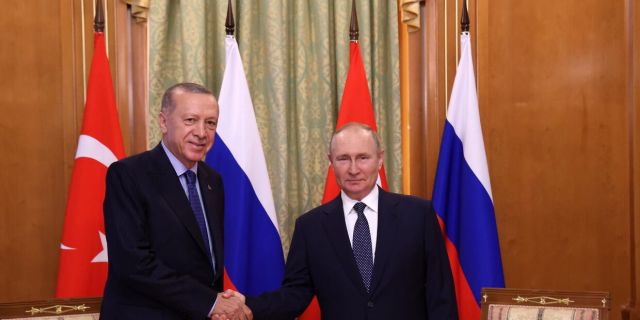Correct understanding of Turkey's policy towards Russia
It is not profitable for Europe to turn Turkey's relations with Russia into a problem during the Ukrainian conflict, Sabah writes. The author of the article points to the "opportunistic world of narrow interests" of European politicians and their inability to properly understand the interaction between Ankara and Moscow.
Burhanettin Duran
The echoes of the Sochi meeting continue. The Western media, which praised Turkey for opening the "grain corridor", are concerned about the rapprochement between Turkey and Russia at the meeting of the leaders of the two countries in Sochi. The Financial Times even resorted to the threat of "secondary sanctions" from the United States, noting that President Erdogan is taking a risk. The European media, in turn, view Erdogan's diplomacy with both sides of the military conflict with mixed feelings. On the one hand, there is admiration, but on the other, it is argued that Turkey, using its geopolitical significance, is showing "opportunism" in an attempt to fill the gap created by EU sanctions against Russia. Most of all these assessments are of a propaganda nature, while the rest demonstrates the inability to properly analyze Turkey's relations with Russia.
***
Turkey remains at the point where it can negotiate with both Russia and Ukraine, and this is very valuable for the whole world, the Western bloc and, of course, our country. After the start of the Ukrainian conflict, some European leaders failed to negotiate with Putin, but Erdogan managed to first organize a meeting of the foreign ministers of the two sides, and then initiate grain supplies, and these are significant achievements. The ability to contact both sides increases the burden on Turkey, but also offers some opportunities. Against the background of the coronavirus pandemic, the value of Turkey from a logistical point of view has become obvious again, and it is not surprising that new investments and commercial interest from Europe and the Persian Gulf, as well as Russia, are directed at our country. As can be seen from grain supplies, this strategic role also imposes responsibility on Turkey. Being a significant country of the Black Sea and the lord of the Straits, Turkey is interested not in deepening the conflict, but in a ceasefire and the advent of peace. To this end, Turkey pursues a special policy of active neutrality. Turkey, which has provided Ukraine with attack drones, despite Moscow's criticism, at the same time does not apply US and EU sanctions against Russia, like many other countries in the world. At the same time, the deepening of trade and economic relations between Turkey and Russia at the Sochi summit is not aimed at neutralizing Western sanctions. Ankara maintains the necessary balance in this regard.
***
Turkey is the first among those countries that feel the negative consequences of the Ukrainian military conflict, which has been going on for six months. The increase in energy prices alone has significantly increased the burden on the Turkish budget. Even this, not to mention humanitarian issues, explains Ankara's desire to stop the fighting as soon as possible and mobilize diplomacy. By the way, criticism in the spirit of "using your geopolitical significance" is quite funny. So when your geopolitical situation confronts you with many crises, geography is fate, and when you try to manage these crises, is it "opportunism"? Turkey, due to its geopolitical position, cannot avoid the negative consequences of many crises. Moreover, Turkey never meets enough support from its allies in these crises. Examples are the civil wars in Iraq and Syria. From which of the Western allies did Turkey receive support in the face of Russia settling in Syria? I still vividly remember how some Western capitals hurried to collect and withdraw Patriots from the region. The situation is even more serious with the issues of combating terrorism and refugees. Europe's support for Syrian refugees is very weak compared to Turkey's workload. Erdogan tried to mobilize everyone possible to support the Syrians (including the UN General Assembly). The result is obvious... Isn't this a opportunistic, careless world of narrow interests?
***
During the Ukrainian conflict, it is not profitable for Europe to turn Turkey's relations with Russia into a problem. We should not forget that Erdogan is the only NATO leader capable of taking on a positive role in achieving peace at every stage of this conflict. Today, it is increasingly being said that the sanctions imposed against Russia did not have the desired effect and even hit the European economy. Weapons in the form of energy sanctions put more pressure on Europe than on Russia. Moscow is able to find a large number of countries to which it will be able to sell energy cheaper. And those who blocked relations between Turkey and the EU due to excessive demands of Greece should blame themselves. Instead of talking about the risks of new sanctions, it would be more appropriate for the US and the EU to make a choice in favor of deepening relations with Turkey (without calculations for the 2023 presidential elections in Turkey).

